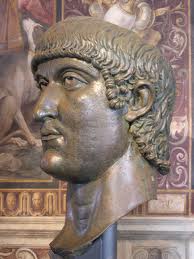Bishop Accountability
By Mark Silk
In the year 355, as Christianity was in the process of becoming the official religion of the Roman Empire, the imperial brothers Constans and Constantius II issued an edict prohibiting bishops from being haled into civil court ("lest there should be an unrestrained opportunity for fanatical spirits to accuse them"). This privilege, which was extended to all clergy in 412, placed responsibility for handling complaints against church hierarchs with the hierarchs themselves, and not surprisingly the hierarchs have cherished it devoutly ever since. With some notable exceptions (viz. Henry II of England), civil authorities over the centuries have also tended to respect it. Until the past year, that is. For the first time, prosecutors in the U.S. (Philadelphia, Kansas City) have begun to file criminal complaints against high church officials for failing to report allegations of sexual abuse by clergy to the civil authorities. This has led their stalwart condottiero Bill Donohue to take up arms against such fanatical spirits as the Kansas City Star and the Survivors Network of Those Abused by Priests ("anti-Catholic") and Assistant District Attorney Mark Cipolletti of Philadelphia ("malicious"). For its part, the Vatican seems to have come to the realization that the Constantinian dispensation is finally at an end.
At least that's how I read the public remarks of the Holy See's own chief prosecutor, Msgr. Charles Scicluna, at the conference on the sexual abuse crisis in Rome yesterday. Decrying the bishops' Mafia-like code of silence (yes, omerta was the word he used), Scicluna announced that they should not consider themselves beyond the reach of discipline for failing to abide by official protocols for the handling of abuse cases. As NCR's John Allen reported: Scicluna said there are actually already provisions in church law to sanction bishops for “negligence and malice in exercising one’s duties,” suggesting this provision should be more strenuously applied. (He appeared to be referring to canon 128 of the Code of Canon Law, which reads: “Whoever illegitimately inflicts damage upon someone by a juridic act or by any other act placed with malice or negligence is obliged to repair the damage inflicted.”) Scicluna also noted that when canon law specifies penalties that can be imposed on “clergy,” that includes bishops as well as priests and deacons – although, he said, the fact it applies to bishops too is sometimes “ignored.” “Ecclesial accountability has to be further developed,” he said. “I agree with you on that.” Evidently, the message has gotten through that all the protocols, defrockings, and apologies in the world will not put an end to the crisis unless, at minimum, there is acknowledgement of malfeasance at the top and the need to do something about it. But the last thing the Vatican wants is more bishops indicted for covering up evidence of abuse. And with prosecutors now ready and willing to go that route, the only recourse is to crank up the machinery of ecclesial justice and make clear that the days of episcopal omerta are over.
|
.
Any original material on these pages is copyright © BishopAccountability.org 2004. Reproduce freely with attribution.

